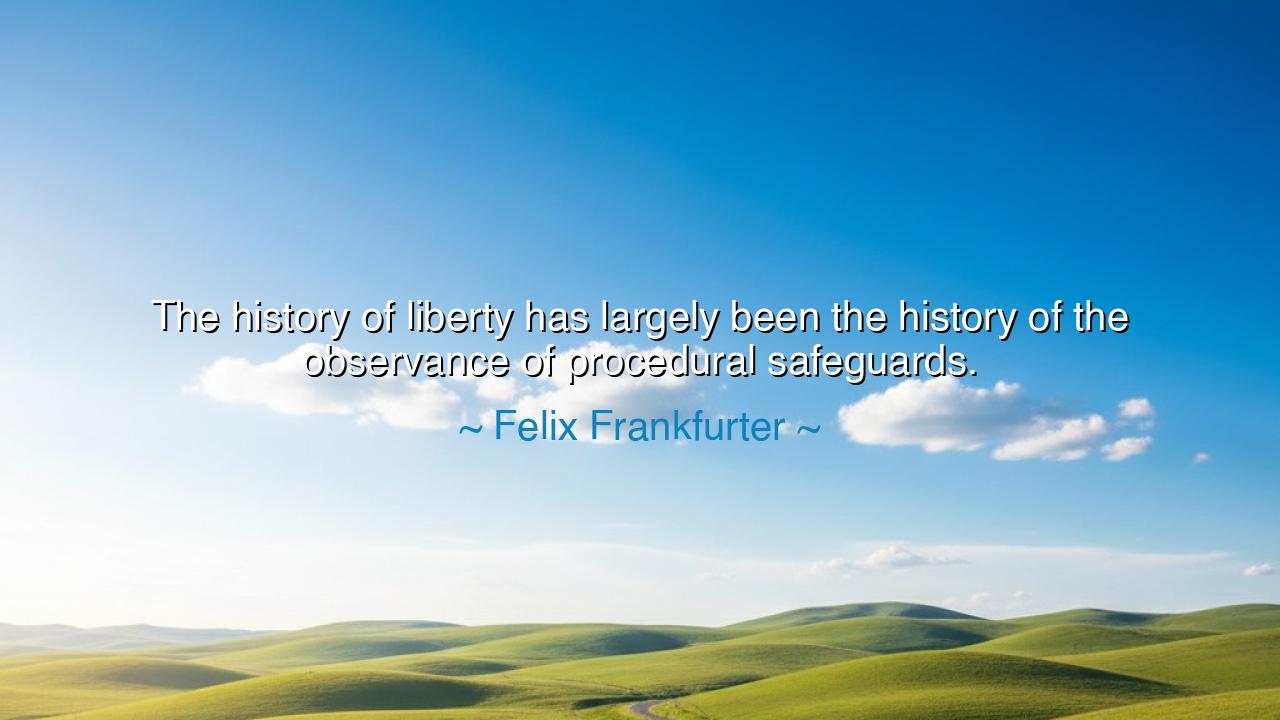
The history of liberty has largely been the history of the
The history of liberty has largely been the history of the observance of procedural safeguards.






“The history of liberty has largely been the history of the observance of procedural safeguards.” — Felix Frankfurter
Hear these words, O guardians of freedom, and mark them well, for they come from one who sat in judgment over the laws of men. Felix Frankfurter, a Justice of the United States Supreme Court, spoke not of glory won on the battlefield nor of revolutions crowned with banners, but of the quieter, subtler battle that determines whether liberty shall endure. He teaches that freedom does not survive by passion alone, but by procedure—those humble, deliberate forms that restrain power, protect fairness, and preserve justice. The history of liberty, he reminds us, is not a tale of grand proclamations, but of men and women who honored the rules that prevent might from crushing right.
In these words, Frankfurter speaks as both a jurist and a philosopher of democracy. He saw that the strength of a free nation does not lie in the eloquence of its ideals, but in the discipline with which those ideals are enforced. Procedural safeguards—the right to trial, the presumption of innocence, the fair hearing, the separation of powers—are the invisible pillars upon which liberty stands. Without them, even the noblest intentions decay into tyranny. For when the forms of justice are broken, the spirit of justice soon follows. The tyrant often begins not with open cruelty, but with the quiet erosion of process—the short-cut, the exception, the justified violation “for the greater good.”
History bears witness to this truth. In the fall of the Roman Republic, liberty was not lost in a single day; it eroded as citizens accepted the concentration of power in the hands of a few. The Senate still met, the laws were still recited, but the procedures that balanced the will of the people with the power of the state were hollowed out. What began as convenience became corruption, and soon the republic gave way to empire. Thus, Rome’s decline was not only military or moral—it was procedural. When safeguards vanished, liberty perished, and the laws became instruments of command, not protection.
Yet there are also stories of those who preserved freedom by preserving the form. Consider the Magna Carta of 1215, when the barons of England, weary of a king’s arbitrary will, forced him to sign a charter that declared: “No free man shall be imprisoned except by the lawful judgment of his peers or by the law of the land.” That single sentence—the seed of due process—became the root from which modern liberty grew. It established that power must act through form, and that law must be followed even by the mighty. From that moment, the observance of procedure became not mere bureaucracy, but the ritual of freedom itself.
Frankfurter understood that liberty, if it is to live, must dwell in the habits of the people as much as in their hearts. Laws are not chains; they are the measured rhythms of justice. A society that respects procedure respects restraint; it accepts that even in the pursuit of righteousness, one must not abandon fairness. For when we discard rules to punish an enemy, we create a weapon that may one day be turned upon ourselves. Thus, the wise jurist reminds us: the forms of law are not mere formality—they are the armor of civilization, forged in the fires of centuries.
The lesson, then, is clear for all who walk in positions of power, great or small. Whether you judge a nation or manage a household, observe the safeguards. Be slow to condemn, patient to listen, careful to follow the path of fairness even when haste or anger tempts you otherwise. True liberty is not the freedom to act without restraint—it is the freedom to live under laws that are just, predictable, and applied equally to all. The careless breaking of form in the name of expedience is the first crack in the foundation of freedom.
So let this teaching be written in your heart: Liberty lives where procedure is honored. The spirit of freedom depends not on passion alone, but on discipline—on the humble act of following right process even when no one watches. Every time we insist on fairness, every time we demand that rules be upheld, we add another stone to the fortress of liberty. As Frankfurter taught, the great battles for freedom are not always fought with swords or slogans—they are fought in the quiet rooms where justice is done according to law. Guard those rooms, O children of democracy, for within their walls, the fate of liberty forever turns.






AAdministratorAdministrator
Welcome, honored guests. Please leave a comment, we will respond soon